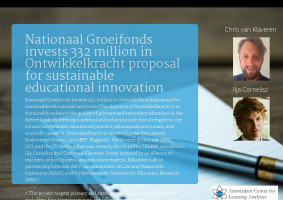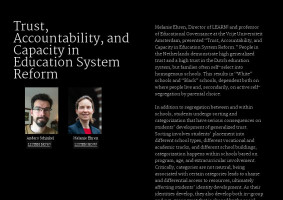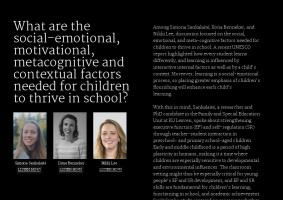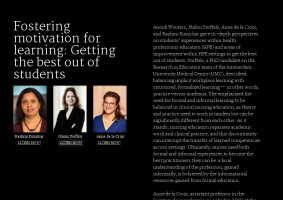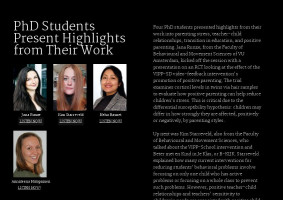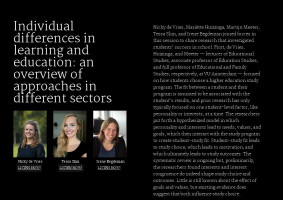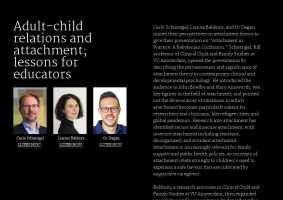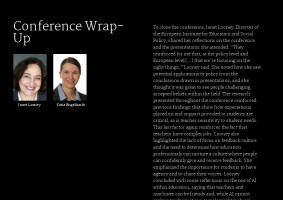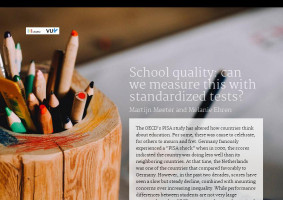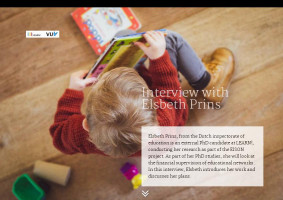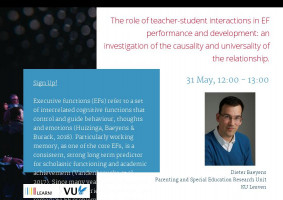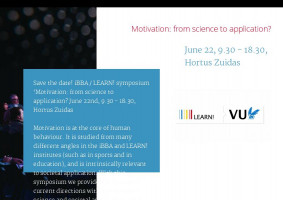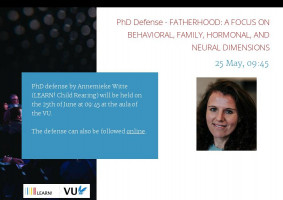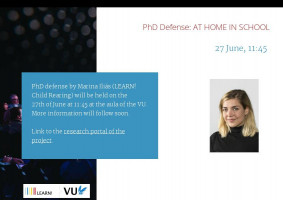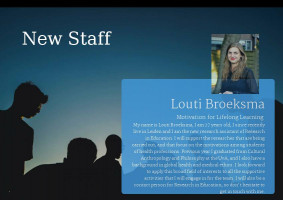Four PhD students presented highlights from their work into parenting stress, teacher-child relationships, transition in education, and positive parenting. Jana Runze, from the Faculty of Behavioural and Movement Sciences of VU Amsterdam, kicked off the session with a presentation on an RCT looking at the effect of the VIPP-SD video-feedback intervention’s promotion of positive parenting. The trial examines cortisol levels in twins via hair samples to evaluate how positive parenting can help reduce children’s stress. This is critical due to the differential susceptibility hypothesis: children may differ in how strongly they are affected, positively or negatively, by parenting styles.
Up next was Kim Starreveld, also from the Faculty of Behavioural and Movement Sciences, who talked about the VIPP-School intervention and Beter met en Kind in Je Klas, or B-KIJK. Starreveld explained how many current interventions for reducing students’ behavioral problems involve focusing on only one child who has active problems or focusing on a whole class to prevent such problems. However, positive teacher-child relationships and teachers’ sensitivity to children’s needs are associated with positive child functioning, indicating that an intervention focusing on these elements could effectively reduce students’ behavioral problems. Results from the pilot study for B-KIJK are promising, and the pilot has brought the researchers’ attention to how the intervention can be improved for the sake of teachers and students alike.
Neha Basnet, from the Faculty of Behavioural and Social Sciences at the Rijksuniversiteit Groningen, then presented on timeline mapping exercises, or a way to study life trajectory and to investigate how people’s lives transition from one stage to another. Basnet detailed the various ways researchers can conduct the timeline exercise and how they can explain the process to their participants without biasing the results. She emphasized the method’s usefulness in qualitative research to help understand an individual’s rich journey through life and the decisions they have made. Basnet concluded by calling attention to the potential utility of timeline mapping in organizational settings to track shifts within an organization over time.
To close the session, Annaleena Holopainen, from the Faculty of Behavioural and Movement Sciences at VU Amsterdam, spoke about mothers’ trait-like parenting stress, social support, and burnout during COVID-19. Mothers have faced an inordinate amount of stress during the pandemic due to parenting responsibilities, household care, working from home, and other life stressors. Thus, Holopainen described the process of operationalizing trait-like parenting stress and examining the impact of mothers’ trait-like stress — and social support — on parental burnout during COVID. The research findings show how parenting stress is primarily caused by trait-like (and thus person-dependent) factors, and both long-lasting parenting stress and low social support are risk factors for parental burnout during COVID-19. This information can help manage further crises and, specifically, identify how to best support mothers facing parenting stress and burnout.
During the Q&A, conversations among speakers and attendees discussed how it is currently unclear if parents’ number of children impacts parental burnout, which highlights another avenue for future research and analysis.
(1)(2)_w200_h280_1.jpg)
(1)_w200_h280_1.jpg)
Listen now!
Listen now!
(2)_w200_h280_1.png)
Listen now!
(2)_w200_h280_1.jpg)
LISTEN NOW!



